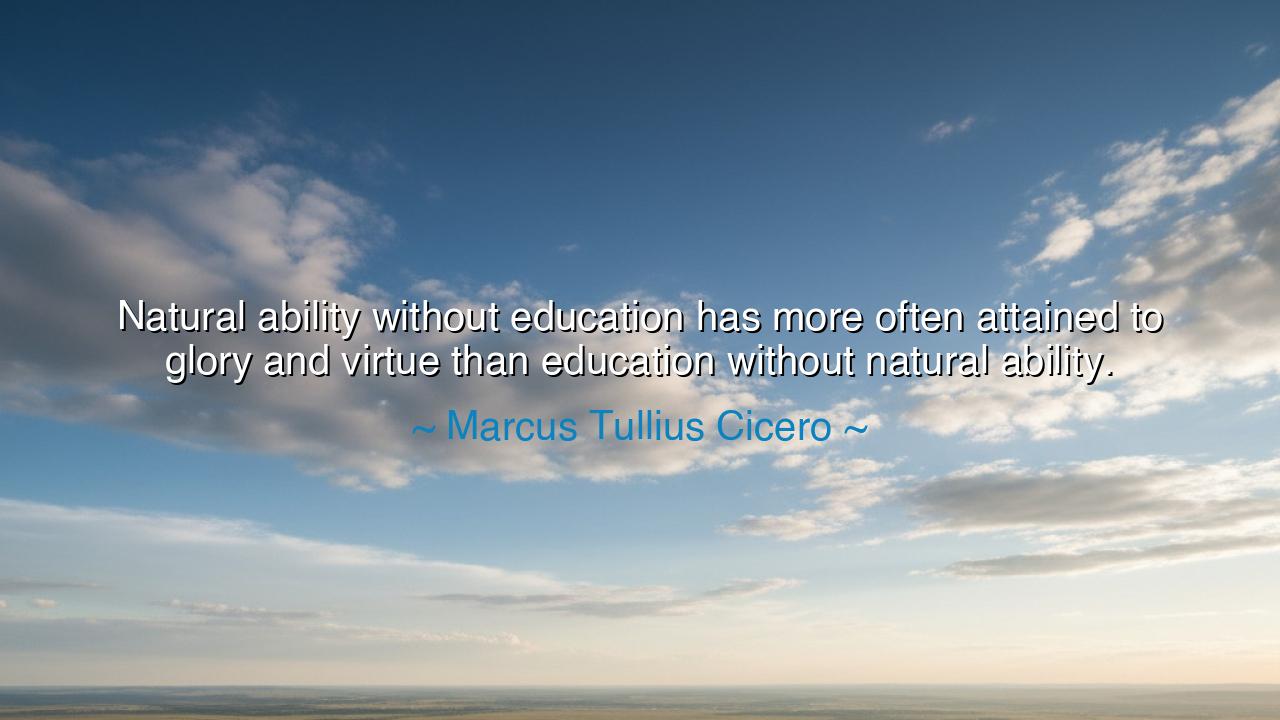
Natural ability without education has more often attained to
Natural ability without education has more often attained to glory and virtue than education without natural ability.






Hear, O seeker of wisdom, the words of Marcus Tullius Cicero, orator of Rome, defender of the Republic, whose tongue moved armies and whose pen preserved the honor of his age: “Natural ability without education has more often attained to glory and virtue than education without natural ability.” These words, spoken with the authority of one who knew both the heights of learning and the struggles of politics, reveal a truth carved deep into the story of mankind—that talent of the soul, when genuine and unquenched, often surpasses the polished ornaments of schooling.
For natural ability is the gift of the gods: the spark of intellect, the fire of courage, the grace of eloquence, the strength of vision. It is the seed planted at birth, hidden within, waiting to grow into greatness. Education, though noble and essential, is but the plow and the water—it may prepare, refine, and discipline, but if no seed lies beneath, what harvest can be reaped? A field without grain, though well-tilled, produces nothing. Yet a wild seed, even unshaped by careful hands, can split the stone and rise toward the sun.
Cicero himself knew this truth, for though he was deeply schooled in Greek philosophy and Roman law, he observed many among his peers who, though equally educated, lacked the inner fire to rise. He also saw men of humble beginnings, untutored in the libraries of Athens, who by sheer force of natural ability won the respect of armies and the loyalty of nations. Rome was not built by scholars alone, but by men of action—men whose genius sprang not from parchment, but from spirit.
Consider the tale of Joan of Arc, centuries later, a peasant girl without letters or schooling. She could not read the sacred texts, nor debate with learned priests. Yet her natural ability—her courage, her clarity of purpose, her unshakable conviction—stirred a broken France to rise again. She, uneducated, changed the course of a war and lifted the heart of a nation, achieving glory and virtue beyond the reach of countless trained commanders. Here was Cicero’s truth, living and aflame.
But mark also the other side: education without natural ability is like a lantern with no flame. It may be finely crafted, adorned with glass and metal, but it gives no light. The world has known many who studied deeply, who memorized texts and mastered forms, yet who lacked the courage to act, the imagination to create, or the virtue to lead. They are like ships richly built, yet without wind in their sails—beautiful to behold, but forever motionless in the harbor.
The wisdom of Cicero does not scorn education; indeed, he himself was one of its greatest champions. Rather, he teaches balance. Education refines natural ability, shaping it into excellence, preventing it from straying into recklessness. But when the choice is between raw genius and empty learning, the soul aflame will always surpass the mind asleep. For glory belongs not to the most instructed, but to the most inspired.
Therefore, O listener, let this be your lesson: seek to cultivate both. Do not despise your natural abilities, however small they may seem; nurture them, sharpen them, let them guide your path. And do not neglect education, for it tempers raw talent into lasting greatness. But remember always that the true root of glory and virtue lies in the fire within. If you have education but no spark, kindle your soul. If you have the spark but lack training, seek discipline to refine it.
For in the end, it is the union of both—natural ability joined with education—that produces the highest form of man: wise, virtuous, and strong. Yet if one must choose, let it be ability of the heart and soul, for it is better to have fire without polish than polish without flame. Such is the teaching of Cicero, carved into the annals of time, and passed now into your hands as a torch. Carry it, and let it light your path.






AAdministratorAdministrator
Welcome, honored guests. Please leave a comment, we will respond soon